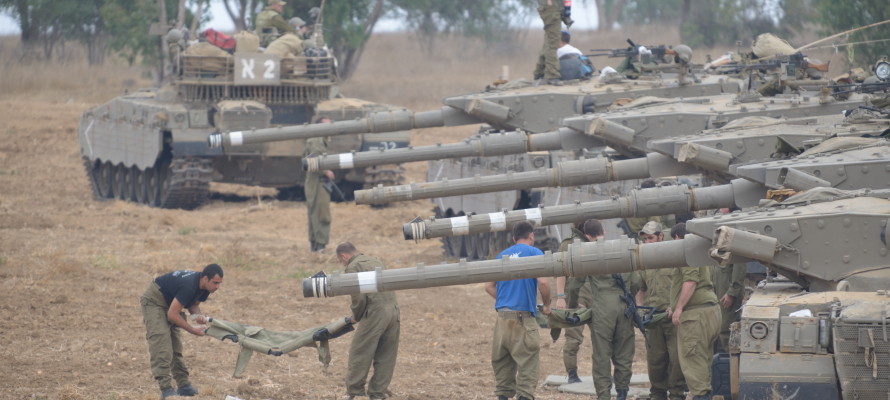As of Monday morning, Hamas has maintained a ceasefire overnight. An Israeli delegation is expected in Cairo to begin talks regarding a permanent arrangement.
Israel and Hamas accepted a new 72-hour ceasefire on Sunday evening, beginning at midnight, which Hamas has maintained overnight.
An Israeli delegation arrived Monday in Cairo for negotiations towards a permanent cessation of fire, which it had agreed to do depending on whether or not Hamas observes the truce.
“No negotiations under fire,” Prime Minister Benjamin Netanyahu stated on Sunday, while Hamas had been firing rockets at southern Israel. Shortly before midnight, a rocket landed in an open area near Tel Aviv.
Israeli Strategic Affairs Minister Yuval Steinitz told Israel Radio Monday morning that demilitarization in Gaza was crucial in order to maintain any long-term agreement. Although a diplomatic solution would be preferable, Israel will continue its operation in Gaza if necessary, he stressed.
Diplomacy Preferable, Military Solution Remains on the Table
“I certainly hope that there will be a diplomatic solution. If there will not be a diplomatic solution, I am convinced that sooner or later we will have to opt for a military solution of taking temporary control of Gaza to demilitarize it again,” he stated.
Senior Hamas official Ahmed Bahr gave no indication of complying with Israel’s basic demand to disarm.
“The weapons of the Palestinian resistance will stay as long as Israeli occupation exists on our occupied land,” he said. “The painful strikes of the resistance on Israel will drive the Israeli negotiator to accept all the demands of the resistance. This is the only language of negotiations they understand.”
Hamas spokesman Fawzi Barhum stated on the weekend that there “will be no backing down from our position…. We will not give up on any of our demands…and these negotiations will not go on indefinitely.”
Hamas Under Great Deal of Strain, Israeli Official Says
“Asked why Jerusalem believes Hamas accepted the ceasefire after rejecting an extension on Friday morning, an Israeli government official said that Hamas was under a great deal of strain that included not only military pressure from Israel but also pressure from many in the Arab world, as well as people in Gaza who want to see the crisis end,” according to The Jerusalem Post.
Egypt’s Foreign Ministry urged “both sides to exploit this truce to resume indirect negotiations immediately and work towards a comprehensive and lasting ceasefire agreement.”
UN Secretary-General Ban Ki-Moon expressed his “strong hope that this will give the two sides, under Egyptian auspices, another chance to agree on a durable ceasefire for the benefit of all civilian populations and as a starting point to address the underlying grievances on both sides.”
Written by: United with Israel Staff
